TAGGED AS: Apple TV Plus, Apple TV+, Drama, streaming, television, TV
Despite Samuel L. Jackson’s lengthy acting career — from his role in Spike Lee’s Do the Right Thing to his many appearances as Marvel character Nick Fury — he has yet to lead a television series. With Apple TV+’s The Last Days of Ptolemy Grey, that is about to change. Jackson stars and executive produces the project, which follows the story of Ptolemy Grey, an elderly man struggling with dementia who’s living in solitary squalor, and the loved ones who offer support for (or take advantage of) his deteriorating condition.
Inspired by the critically acclaimed book by Walter Mosley (Devil in a Blue Dress), who also executive produced the six-episode limited series, the program features a talented ensemble that includes Dominique Fishback (Judas and the Black Messiah) as his young caregiver Robyn; Damon Gupton as Coydog, Ptolemy’s uncle and mentor in flashbacks; Omar Benson Miller as his beloved nephew Reggie; Marsha Stephanie Blake as his mistrusting niece Niecy; Cynthia Kaye McWilliams as his one true love Sensia; and Walton Goggins as Dr. Rubin, the man whose experimental treatment gives Ptolemy a temporary sense of clarity and a new (albeit brief) lease on life.
Jackson spoke about the long-gestating project during the 2022 Television Critics Association Winter Tour and, weeks later, during the show’s official press day, Mosley and members of the cast spoke with Rotten Tomatoes about the deep importance of the show’s subject matter, the use of memory as a storytelling tool, the unique love story that resides at the show’s core, and much more. Here are six things you should know about The Last Days of Ptolemy Grey.
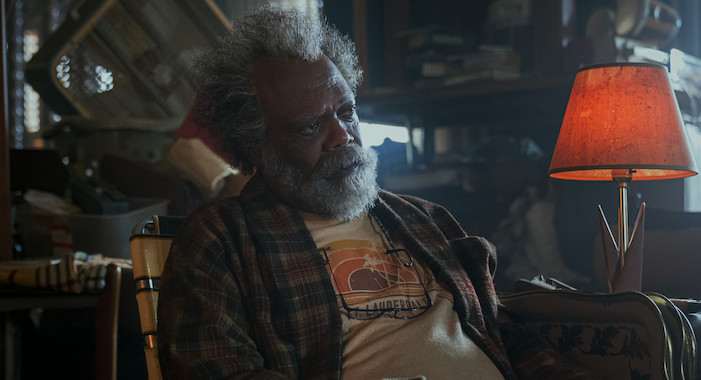
(Photo by Apple TV+)
Since first picking up the book in 2010, Jackson has been focused on adapting Walter Mosley’s story. For the actor, the tale of an older man who is grappling with dementia and is haunted by the memories of his past hit close to home. Jackson said he felt it imperative to shine a light on the issues of dementia and mortality, under the specific lens of Alzheimer’s disease, as many people who struggle with the condition end up being without agency, voice, and understanding.
“I’m from a family where I felt like I was surrounded by Alzheimer’s,” Jackson revealed. “My grandfather, my uncle, my aunt, my mom, there are people on my father’s side who have Alzheimer’s. I watched them change, deteriorate, and become different people over the years. And being able to tell their story, to understand that things in their past are more their present, and understand how to convey that to people, and give an audience an opportunity to know that they aren’t the only people who watch their loved ones deteriorate that way. The memories that they have aren’t in a place that they should abandon. It’s OK to have that, and it’s OK to remember. It’s OK to live in that place. You are still a worthwhile individual even though a lot of people discard you.”
Considering the amount of time they worked to get this series made, it’s unsurprising to think that Jackson’s inner work as an actor was constantly being exercised. Those wheels have been spinning for some time, and while Fishback revealed her method for bringing characters to life involves journaling and creative introspection, Jackson said he’s not at all a method actor when it comes to stepping in front of the camera.
“I kind of do all that work before I get to work so that when it’s time for the work to happen, I just kind of flow into it,” Jackson said. “I’ve seen this series for about 10 years in my head, so when it was time to do those things, I just kind of turn on the emotional asset that I’m able to access and do it. And then when I get off, I talk to my agent on the phone about things that I need to do later on.”
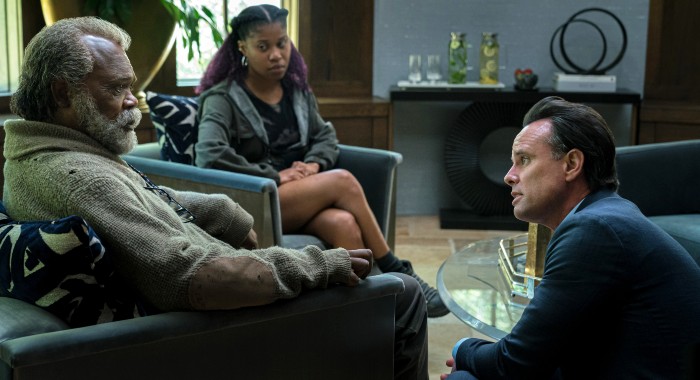
(Photo by Apple TV+)
Throughout the development process, The Last Days of Ptolemy Grey took on different shapes. As Mosley explained, adapting the book to a television show was always the plan. But it was a challenging one.
“It’s hard for people in television; they have a very specific idea of what they want to do and this doesn’t really fit into it,” he said. “I think we were at HBO for a while, and HBO wanted to make it a movie. We didn’t really want to make a movie, because movies are short stories. They’re not the larger stories that need to be told. We talked about doing a series with them, but that wasn’t what they were doing right then. And so we went off and but we just kept working, we kept talking about it, and there would be times that we didn’t do anything.”
During the TCA panel, Mosley delved a bit deeper into the elements that make his show vastly different from the entertainment currently found on TV.
“I don’t know of any show like this one, There are so many things differently — the idea of just concentrating on having a whole experience around a person who’s experiencing dementia in a television environment, episodic. What he goes through, how he responds, what he does. And then on top of that, Black characters going through this experience that — usually if you start dealing with characters outside of what people consider the mainstream of America, they have particular roles that they’re playing, but we had a completely different experience. It’s not a movie, which would’ve been too short for this, and it’s not exactly television, either. It’s a kind of a streaming ocean that you embark upon. And so it was a great deal of fun doing it, and it felt very different.”
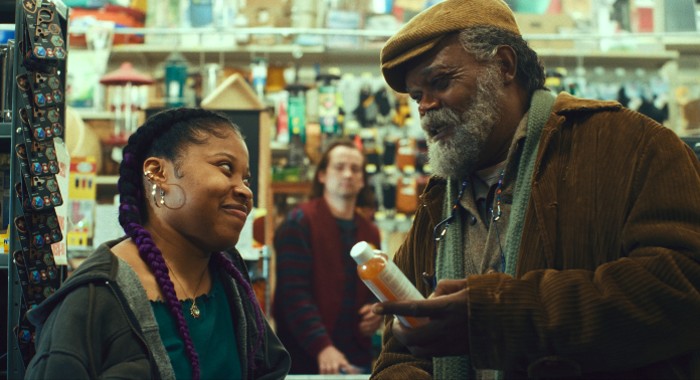
(Photo by Apple TV+)
From trying to make it into a movie, to parting ways with HBO, Mosley admits it was a long journey to finding a team that could stay true to his vision and bring the show to life on his terms. And by all accounts, Apple TV+ was the perfect home for the project.
“They were like, we do different things,” he revealed. “Everybody else does the detective stories, the war stories, the fairies flying around, we’re gonna do something different. And they liked it. We put it together. And that’s it.”
McWilliams echoed his sentiments: “Apple is doing a fantastic job at separating themselves as a streaming platform. That really is when they call it ‘an Apple Original.’ They’re doing things in an original way. They’re allowing each thing to have its own art, its own sort of world. It’s like an art-house platform, in my opinion. I just love it. I really like what they’re doing and I think this was the perfect place for it.”
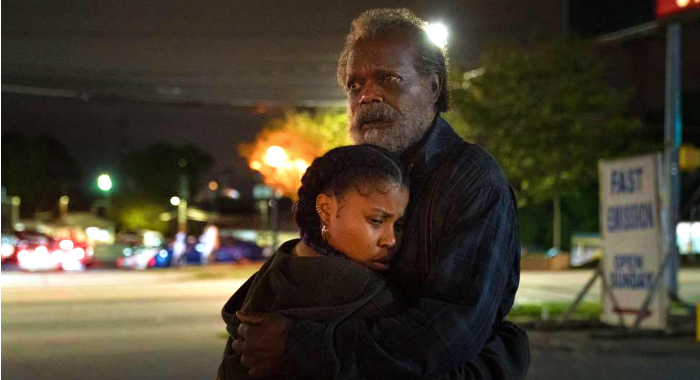
(Photo by Apple TV+)
There are two love stories that anchor Ptolemy’s experience throughout the show’s six-episode run: that of his romantic bond with Sensia in the past, and his current connection with Robyn in his present. While their relationship is ultimately brief, the young caregiver comes in and changes his life for the better, and his mentorship and acceptance alter her own path for good. It’s an unconventional love story and one that keeps the story anchored from beginning to end.
“I think that love is always an interesting thing, because it’s different for the two different people feeling it,” Mosley said. “If they’re not feeling the same thing, they’re feeling different things that work together very well. She needs somebody not only to love her, but to respect her and to basically, in that term, give her respect. He needed somebody to help pull him back into the world. He was out there, he was drifting way out on the horizon, and he needed somebody to pull him back in. In turn, she needed somebody to need her. That’s a way that she could reveal herself. And so is it a love story? Definitely. But it’s not Romeo and Juliet. It’s not that love story. It’s two people who deeply care for each other and see potential in each other.”
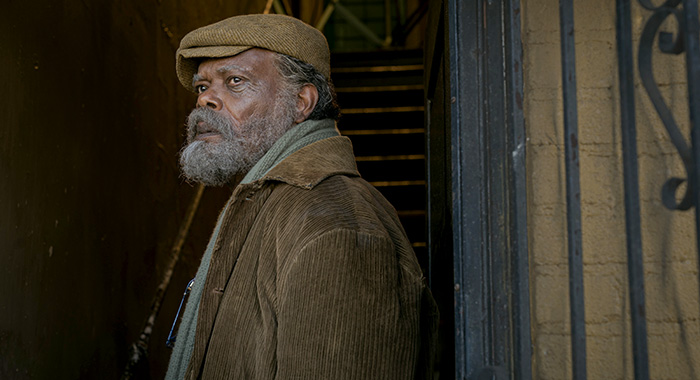
(Photo by Apple TV+)
Jackson’s passion for telling this story and honoring his own family is a perspective shared by each member of the cast. And considering how relatable the conflicts featured in the series are, audiences from all walks of life will surely connect with the struggles Ptolemy and his loved ones face throughout the chaos of his mental condition.
“I think one of the reasons it’s gonna resonate with people is because everyone either has, or will deal with, loss, grief, illness, deterioration, and decay, either in themselves or in someone that they love,” Miller explains. “And I think that everybody will find somebody that identifies with that, possibly, with the character that I play, the Reggie character, who is Ptolemy’s nephew, who has become his caretaker, somebody who he grew up idolizing and mentoring. And in the book, you learn about the various things that Ptolemy taught Reggie, he was a cool uncle to him when he was a child. And now the tables have turned, and Ptolemy has outlived his peer group age-wise, and the responsibility is somewhat neglected, but it has fallen to Reggie, and it’s something that he takes very seriously in taking care of his uncle in the midst of taking care of his own life.”
![]() 90%
The Last Days of Ptolemy Grey: Limited Series
(2022)
premieres Friday, March 11 on Apple TV+.
90%
The Last Days of Ptolemy Grey: Limited Series
(2022)
premieres Friday, March 11 on Apple TV+.